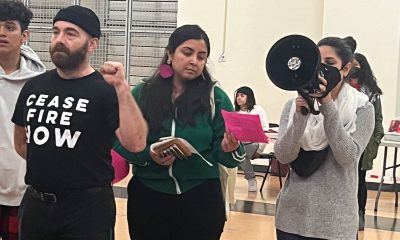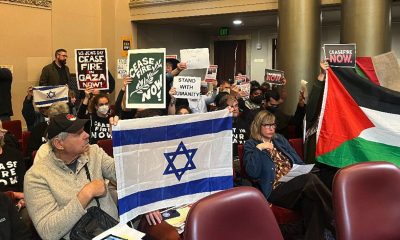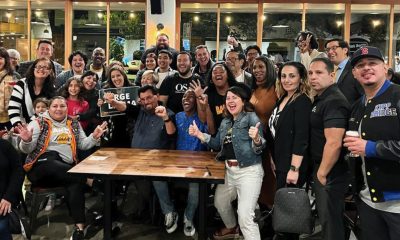Community
OUSD Places Security Officers on Leave After Video Shows Student Was Punched and Choked
By Post Staff
Schools Supt. Antwan Wilson has apologized to a student and his family on behalf of the school district after a video was released last week that shows two school security officers using excessive force to subdue a Fremont High school freshman, including punching him and placing him in a chokehold.
District officials contacted the student’s family last Friday to apologize, and Supt. Wilson apologized in an internal memo to district staff and leadership.
“We are deeply sorry and apologize to (the student) and his family, as well as the OUSD community at large,” he wrote. “What happened in this January 2014 incident is absolutely unacceptable. This should not and cannot occur anywhere in OUSD, ever.”
The January 2014 incident occurred during the administration of interim Supt. Gary Yee. Supt. Wilson, who started in July, told staff that this incident would be investigated and all previous investigations related to excessive force by school security officers would be reviewed.
The significance of the video did not come to light until Oakland Unified School District’s Legal Department received an inquiry from a local attorney.
When Oakland School Police Chief Jeff Godown reviewed the written report and the DVD of the incident, he discovered that the video did not corroborate the written report, and proper protocols were not followed in handling of the incident, according to a school district memo.
Chief Godown was not yet working for OUSD at the time of the incident.
“The only narrative in the entire (district police report) that had any truth to it is the child’s statement,” said the chief.
“I just don’t see any reason for them to have physically touched him or pushed him,” he said. “You see the kid punch the (school security officer), which he admits because he’s choking to death,” Godown said.
In response to the video, the district “placed the two (security officers) in question on administrative leave, effective Tuesday, March 3,” sent the video to the local police and District Attorney for potential criminal prosecution, and is planning to provide training for all school security officers, according to the March 6 memo.
“This incident is unacceptable because of its very nature: adults in an educational environment treating a child in a violent manner,” the memo said. “The overall response of the students and adults in the video suggest disturbing acceptance of this type of situation.”
This incident comes less than a year after another incident where two school security officers assaulted a student in a wheelchair at Oakland High in May 2014.
“While the Fremont incident predates the one at Oakland High by several months, their proximity suggests a systemic problem that needs to be addressed with significant and tangible reform,” the memo said.
The January 2014 video shows the 15-year-old student in a doorway when he is confronted by two security guards, one of whom shoves him from the back. They place him in a chokehold and drag him, his arm twisted, into the office of the school.
When he attempts to flee, he is pushed against a wall and swings at the security officers. Then, mostly off camera, according to district officials, one of the officers punches him several times.
Supt. Wilson said in his letter to school employees: “When I watched the video, I was angered by what I saw; not only the excessive force, but also the apparent response of some of the adults who either failed to act on behalf of the student during and/or after the incident,” he wrote.
“The security footage shows people going about business normally as the struggle unfolds in the school office,” he wrote.
School district spokesman Troy Flint told the Post that the video was originally “reviewed by certain site staff as well as members of the police force who conducted an investigation of the incident.”
“Our concern, beyond the obvious and reprehensible misconduct,” Flint said, “is that the investigation was not conducted to an appropriate standard and that relevant personnel beyond those at the school site, staff and in the police department were not informed of the incident. That includes (former interim Supt.) Gary Yee.”
A school security officer goes to trial next month for felony assault for punching the student in a wheelchair in May 2014 at Oakland High School.
The security officer’s attorney Nabiel Ahmed told the SF Chronicle: “Without the appropriate resources, a school security officer is forced to deal with a very difficult situation alone or with very limited help.”
Activism
Oakland Post: Week of April 17 – 23, 2024
The printed Weekly Edition of the Oakland Post: Week of April 17 – 23, 2024

To enlarge your view of this issue, use the slider, magnifying glass icon or full page icon in the lower right corner of the browser window. ![]()
Activism
Oakland Schools Honor Fred Korematsu Day of Civil Liberties
Every Jan. 30, OUSD commemorates the legacy of Fred Korematsu, an Oakland native, a Castlemont High School graduate, and a national symbol of resistance, resilience, and justice. His defiant stand against racial injustice and his unwavering commitment to civil rights continue to inspire the local community and the nation. Tuesday was “Fred Korematsu Day of Civil Liberties and the Constitution” in the state of California and a growing number of states across the country.

By Post Staff
Every Jan. 30, OUSD commemorates the legacy of Fred Korematsu, an Oakland native, a Castlemont High School graduate, and a national symbol of resistance, resilience, and justice.
His defiant stand against racial injustice and his unwavering commitment to civil rights continue to inspire the local community and the nation. Tuesday was “Fred Korematsu Day of Civil Liberties and the Constitution” in the state of California and a growing number of states across the country.
One OUSD school is named in his honor: Fred T. Korematsu Discovery Academy (KDA) elementary in East Oakland.
Several years ago, founding KDA Principal Charles Wilson, in a video interview with anti-hate organization “Not In Our Town,” said, “We chose the name Fred Korematsu because we really felt like the attributes that he showed in his work are things that the children need to learn … that common people can stand up and make differences in a large number of people’s lives.”
Fred Korematsu was born in Oakland on Jan. 30, 1919. His parents ran a floral nursery business, and his upbringing in Oakland shaped his worldview. His belief in the importance of standing up for your rights and the rights of others, regardless of race or background, was the foundation for his activism against racial prejudice and for the rights of Japanese Americans during World War II.
At the start of the war, Korematsu was turned away from enlisting in the National Guard and the Coast Guard because of his race. He trained as a welder, working at the docks in Oakland, but was fired after the bombing of Pearl Harbor in 1941. Fear and prejudice led to federal Executive Order 9066, which forced more than 120,000 Japanese Americans out of their homes and neighborhoods and into remote internment camps.
The 23-year-old Korematsu resisted the order. He underwent cosmetic surgery and assumed a false identity, choosing freedom over unjust imprisonment. His later arrest and conviction sparked a legal battle that would challenge the foundation of civil liberties in America.
Korematsu’s fight culminated in the Supreme Court’s initial ruling against him in 1944. He spent years in a Utah internment camp with his family, followed by time living in Salt Lake City where he was dogged by racism.
In 1976, President Gerald Ford overturned Executive Order 9066. Seven years later, the 9th Circuit Court of Appeals in San Francisco vacated Korematsu’s conviction. He said in court, “I would like to see the government admit that they were wrong and do something about it so this will never happen again to any American citizen of any race, creed, or color.”
Korematsu’s dedication and determination established him as a national icon of civil rights and social justice. He advocated for justice with Rosa Parks. In 1998, President Bill Clinton gave him the Presidential Medal of Freedom saying, “In the long history of our country’s constant search for justice, some names of ordinary citizens stand for millions of souls … To that distinguished list, today we add the name of Fred Korematsu.”
After Sept. 11, 2001, Korematsu spoke out against hatred and discrimination, saying what happened to Japanese Americans should not happen to people of Middle Eastern descent.
Korematsu’s roots in Oakland and his education in OUSD are a source of great pride for the city, according to the school district. His most famous quote, which is on the Korematsu elementary school mural, is as relevant now as ever, “If you have the feeling that something is wrong, don’t be afraid to speak up.”
Community
For Cervical Cancer Month, Medical Community Focused on Education
January was Cervical Cancer Awareness Month. Physicians, advocates and others in the medical community commemorated the month by raising awareness about a form of cancer they say is highly preventable and treatable. Cervical cancer is caused by a virus called the human papillomavirus (HPV) and it develops slowly over time but can be prevented with proper care in girls as young as 13 years old.

By Magaly Muñoz
January was Cervical Cancer Awareness Month.
Physicians, advocates and others in the medical community commemorated the month by raising awareness about a form of cancer they say is highly preventable and treatable.
Cervical cancer is caused by a virus called the human papillomavirus (HPV) and it develops slowly over time but can be prevented with proper care in girls as young as 13 years old.
Sonia Ordonez, an OBGYN and gynecology surgeon at Kaiser Permanente, stated that as soon as people with cervixes reach the maturity reproductive age, they should start taking preventative measures like getting the HPV vaccine. The vaccine involves a series of two-doses for people aged 9 through 14 or three-doses for people 15 through 45 years old.
“I see a lot of young women who can’t remember or may not have gotten [the vaccine] when they were younger, or maybe got one, but we can give them the series of vaccines and restart at any point in time,” Ordonez said.
She said that cervical cancer is not the only cancer caused by HPV. Strains of the virus can also lead to throat, anal and penile cancers.
Screening is also an effective way to check for cervical cancer and should be done every three years after someone turns 21, doctors recommend. It is best to start as early as possible to catch occurrences early.
Ordonez said that this cancer is also more likely found in people of color and has led to more deaths overall.
A Mayo Clinic article published last month stated that Black women are more likely to be diagnosed and die of cervical cancer, compared to White women in the U.S.
2,000 Black women are diagnosed every year with cervical cancer and 40% die as a result.
“This disparity is not due to genetic differences among White, Black or Hispanic women, but rather related to systemic racism, access to healthcare and socioeconomic factors,” Dr. Olivia Cardenas-Trowers, a Mayo Clinic urogynecologist, said in the article.
Ordonez stated that immigrant women are also highly susceptible to the cancer, as many Latin American countries may not have accessibility to screenings or lack of insurance makes it harder for them to get tested.
Hispanic women are 40% more likely to be diagnosed with cervical cancer, and 30% more likely to die from it, as compared to non-Hispanic White women, according to the Office of Minority Health.
Family medicine physician, Joy Anyanwu, stated that the pandemic contributed to hesitancy about getting cervical cancer screenings among some women. Other factors are people’s aversion to vaccines, parents not wanting to believe that their children are or will become sexually active, and doubt about the overall effectiveness of the vaccine.
“The vaccine is very safe — over 97% effective in preventing cervical cancer,” Anyanwu said. “Even if you aren’t having sex, the earlier you start would actually help.”
Anyanwu said she understands that parents might not want to ask questions about their children’s reproductive health, but it’s a mindset that can be a barrier to having important conversation about prevention or care.
To keep families their families and communties healthy, the doctor emphasized that people should prioritize keeping up with their vaccine series and going to screenings every year.
-

 Activism4 weeks ago
Activism4 weeks agoOakland Post: Week of March 20 – 26, 2024
-

 #NNPA BlackPress3 weeks ago
#NNPA BlackPress3 weeks agoCOMMENTARY: D.C. Crime Bill Fails to Address Root Causes of Violence and Incarceration
-

 #NNPA BlackPress3 weeks ago
#NNPA BlackPress3 weeks agoMayor, City Council President React to May 31 Closing of Birmingham-Southern College
-

 #NNPA BlackPress4 weeks ago
#NNPA BlackPress4 weeks agoCOMMENTARY: Lady Day and The Lights!
-

 #NNPA BlackPress3 weeks ago
#NNPA BlackPress3 weeks agoFrom Raids to Revelations: The Dark Turn in Sean ‘Diddy’ Combs’ Saga
-

 #NNPA BlackPress3 weeks ago
#NNPA BlackPress3 weeks agoBaltimore Key Bridge Catastrophe: A City’s Heartbreak and a Nation’s Alarm
-

 Activism3 weeks ago
Activism3 weeks agoOakland Post: Week of March 27 – April 2, 2024
-

 #NNPA BlackPress3 weeks ago
#NNPA BlackPress3 weeks agoBaltimore’s Key Bridge Struck by Ship, Collapses into Water


















































